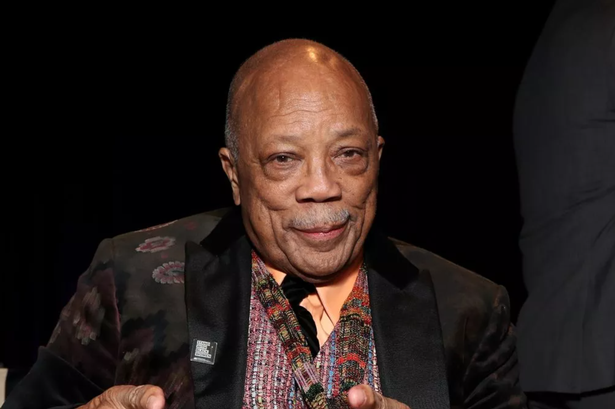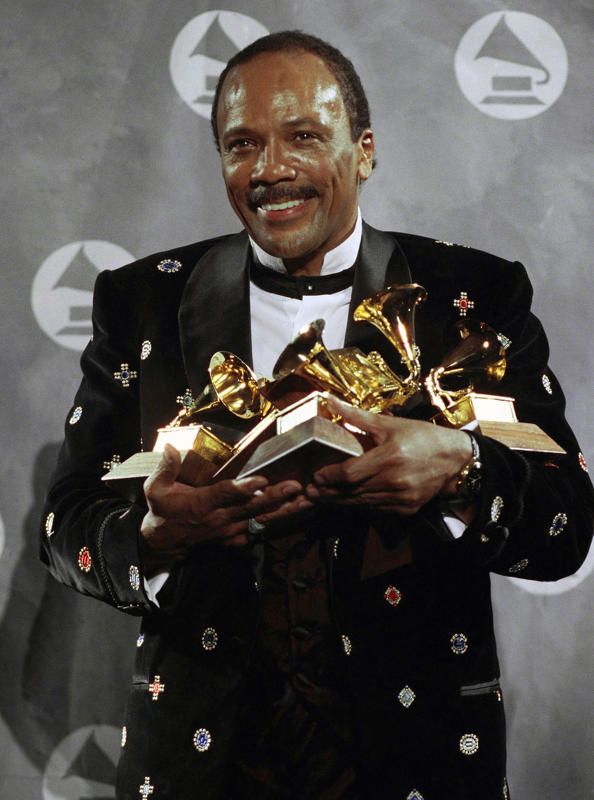
Quincy Jones was born Quincy Delight Jones Jr. on March 14, 1933, and was an American record producer, songwriter, composer, arranger, and film and television producer.
Quincy Jones is widely regarded as one of the most influential figures in American music history, with a career spanning over seven decades, covering a multitude of musical genres and artistic endeavors.
His impact on popular music and culture was profound, with a remarkable tally of 28 Grammy Awards out of 80 nominations and a Grammy Legend Award in 1992. Jones’s extensive work shaped the landscape of jazz, soul, pop, and film scoring, and his collaborations with a wide range of artists—most famously Michael Jackson—set new standards for music production and innovation. Over the years, Jones’s influence extended beyond music into social activism and media production, leaving a legacy that will be remembered for generations.
Early Life and Musical Beginnings
Quincy Jones was born on the South Side of Chicago, Illinois, a tough environment that required resilience and adaptability. His mother, Sarah Frances, was a bank officer and apartment complex manager, and his father, Quincy Delight Jones Sr., was a skilled carpenter and semi-professional baseball player. The family faced considerable challenges, particularly as his mother struggled with mental illness. Jones’s musical awakening came early. By age ten, he had discovered a piano and, shortly after, became obsessed with learning every instrument he could. Moving to Seattle at age 14, Jones met Ray Charles, who became a close friend and one of his earliest musical collaborators.
Jones earned a scholarship to the prestigious Berklee College of Music in Boston, where he studied composition, orchestration, and arranging. In 1951, however, he left Berklee to tour with bandleader Lionel Hampton, an experience that proved invaluable in honing his skills as an arranger and conductor. He then joined the Dizzy Gillespie band in 1956, touring Europe and becoming increasingly known for his sophisticated, jazz-influenced arrangements.
Breaking New Ground as an Arranger and Composer
Throughout the 1950s, Quincy Jones’s reputation as an innovative arranger grew, particularly in jazz circles. His arrangements for artists like Sarah Vaughan, Count Basie, and Duke Ellington brought him widespread recognition. His big break came in 1957 when he composed the score for The Birth of a Band, which showcased his talent for blending jazz with orchestral music. This work laid the foundation for his career as a composer for film and television.
Jones’s style was unique, seamlessly merging traditional jazz with the emerging sounds of rock and roll, blues, and soul. His compositions had a cinematic quality that would later make him one of the most sought-after composers in Hollywood. In 1964, Jones became one of the first African Americans to compose for a major Hollywood film, scoring The Pawnbroker. This success opened doors for future work in film and television scoring.
Transition to Pop Music and Production
In the 1960s, Quincy Jones transitioned from jazz to pop music, becoming a prominent producer and arranger for a new wave of popular musicians. He produced for iconic artists such as Frank Sinatra, Aretha Franklin, and Dinah Washington, each of whom contributed to defining the sound of American music during this period. His partnership with Frank Sinatra was particularly notable; Jones arranged and conducted several of Sinatra’s albums, including Sinatra at the Sands, which remains one of the most celebrated live jazz albums of all time.
Quincy Jones’s work with Sinatra established him as a versatile and innovative producer, a reputation that would later lead to one of his most famous partnerships—with Michael Jackson. Jones produced Jackson’s albums Off the Wall (1979), Thriller (1982), and Bad (1987). The success of these albums, particularly Thriller, which became the best-selling album of all time, cemented Jones’s place in music history. His meticulous approach to production, combined with his ability to draw the best performances from his artists, played a pivotal role in Jackson’s ascent to superstardom.
Thriller and Its Impact on Music and Culture
Thriller, released in 1982, became a cultural phenomenon, transforming the music industry and redefining the possibilities of popular music. Quincy Jones’s production was groundbreaking, merging pop, rock, funk, and R&B into a cohesive sound that appealed to audiences worldwide. The album produced seven Top 10 singles, including “Billie Jean,” “Beat It,” and the title track, “Thriller,” which became iconic through its music video. Jones’s role in the production process was pivotal; he selected the musicians, oversaw the arrangements, and encouraged Jackson to push his creative boundaries.
.
.
The success of Thriller not only revolutionized pop music but also marked a turning point in the music video industry. The video for “Thriller,” directed by John Landis, set a new standard for music videos as cinematic, narrative-driven short films. Jones’s involvement in this project illustrated his forward-thinking approach and his understanding of the visual aspects of music. Thriller remains one of the most influential albums in history, having sold over 100 million copies worldwide and helping to bridge racial barriers in the music industry by appealing to a diverse audience.
Contributions to Film and Television
Beyond his achievements in music production, Quincy Jones made significant contributions to film and television. After his success with The Pawnbroker, he composed scores for notable films such as In Cold Blood (1967), In the Heat of the Night (1967), and The Italian Job (1969). These scores showcased his versatility, as he was able to blend jazz, blues, and orchestral elements in ways that enhanced the cinematic experience.
In 1971, Quincy Jones became the first African American to serve as an executive at a major American record label, Mercury Records. This position allowed him to foster talent and promote diversity within the music industry. During this period, he also created Roots: The Saga of an American Family (1977), the soundtrack for the groundbreaking television miniseries Roots, which was based on Alex Haley’s novel. The series highlighted the history and struggles of African Americans, and its popularity brought attention to Jones’s ability to use music as a means of storytelling and cultural expression.
Later Career and Philanthropic Endeavors
In the 1980s and 1990s, Jones continued to produce, arrange, and compose music across genres. He worked with prominent artists such as Miles Davis, Stevie Wonder, and Donna Summer, maintaining his influence in the music industry. In 1985, he produced the charity single “We Are the World,” written by Michael Jackson and Lionel Richie, and performed by a lineup of superstar artists to raise funds for African famine relief. The song became a global anthem for humanitarian efforts and raised millions of dollars for its cause, showcasing Jones’s dedication to social issues.
Quincy Jones’s interest in philanthropy extended beyond music. He established the Quincy Jones Listen Up Foundation, a nonprofit organization focused on global youth initiatives, particularly those related to arts and education. Through this foundation, Jones sought to provide underprivileged youth with opportunities for artistic expression and personal development. His commitment to social activism was also evident in his involvement with organizations like the NAACP and AmFAR (the American Foundation for AIDS Research).
In 1992, Jones was awarded the Grammy Legend Award, recognizing his lifetime achievements and lasting impact on music. By the end of his career, Jones had won 28 Grammy Awards, making him one of the most decorated artists in Grammy history.
Legacy and Influence
Quincy Jones’s influence on music and culture is immeasurable. He helped bridge the gap between jazz, soul, pop, and R&B, pioneering a genre-blending approach that has inspired generations of musicians and producers. His role in Michael Jackson’s success has been widely recognized as one of the most impactful collaborations in pop music history. Jones’s productions set new standards for sound quality and creativity, influencing the way modern music is recorded and produced.
.

.
As an advocate for diversity in the entertainment industry, Jones broke racial barriers, paving the way for African American artists, composers, and executives. His philanthropic efforts have also made a lasting impact on young people, particularly through his focus on arts education and opportunities for underprivileged youth.
In addition to his musical achievements, Jones became a cultural icon known for his wit, intellect, and commitment to excellence. His autobiography, Q: The Autobiography of Quincy Jones, provides an intimate look into his life, career, and philosophy, capturing the spirit of a man who never stopped pushing the boundaries of what music could achieve. Jones continued to mentor young artists, emphasizing the importance of artistic integrity and creative freedom.
Personal Reflections and Final Years
Quincy Jones lived a life filled with creativity, resilience, and vision. His personal experiences, including overcoming the hardships of his early life in Chicago, contributed to his tenacity and his determination to make a difference. Known for his positive outlook and humor, Jones faced each new challenge with optimism, using his influence to effect change in both the music industry and society at large.
In his final years, Jones remained active in the music industry, often speaking at events, engaging with emerging artists, and participating in projects that reflected his passion for music and social change. He continued to inspire generations of musicians, producers, and fans, leaving an indelible mark on the world of entertainment.
Conclusion
Quincy Jones’s life and career represent the evolution of modern American music. From his early days as a jazz trumpeter and arranger to his role as a groundbreaking producer and composer, Jones constantly pushed the boundaries of musical expression. His work on albums like Thriller, his contributions to film scoring, and his efforts as a social activist reveal a man who was as committed to the art of music as he was to the betterment of society. With 28 Grammy Awards, an unmatched legacy in production, and a reputation as a pioneer who transcended genres and barriers, Quincy Jones will be remembered as one of the most influential figures in music history.
His legacy as a producer, mentor, and philanthropist has left an indelible imprint on the world of music and culture. Quincy Jones was not just a musician; he was an architect of sound and a champion of social progress. His contributions will continue to inspire and shape the music industry for generations to come. As we look back on his remarkable life and career, Quincy Jones’s name will forever be synonymous with excellence, creativity, and the transformative power of music.
Check out Quincy Jones on Amazon.
.
.

